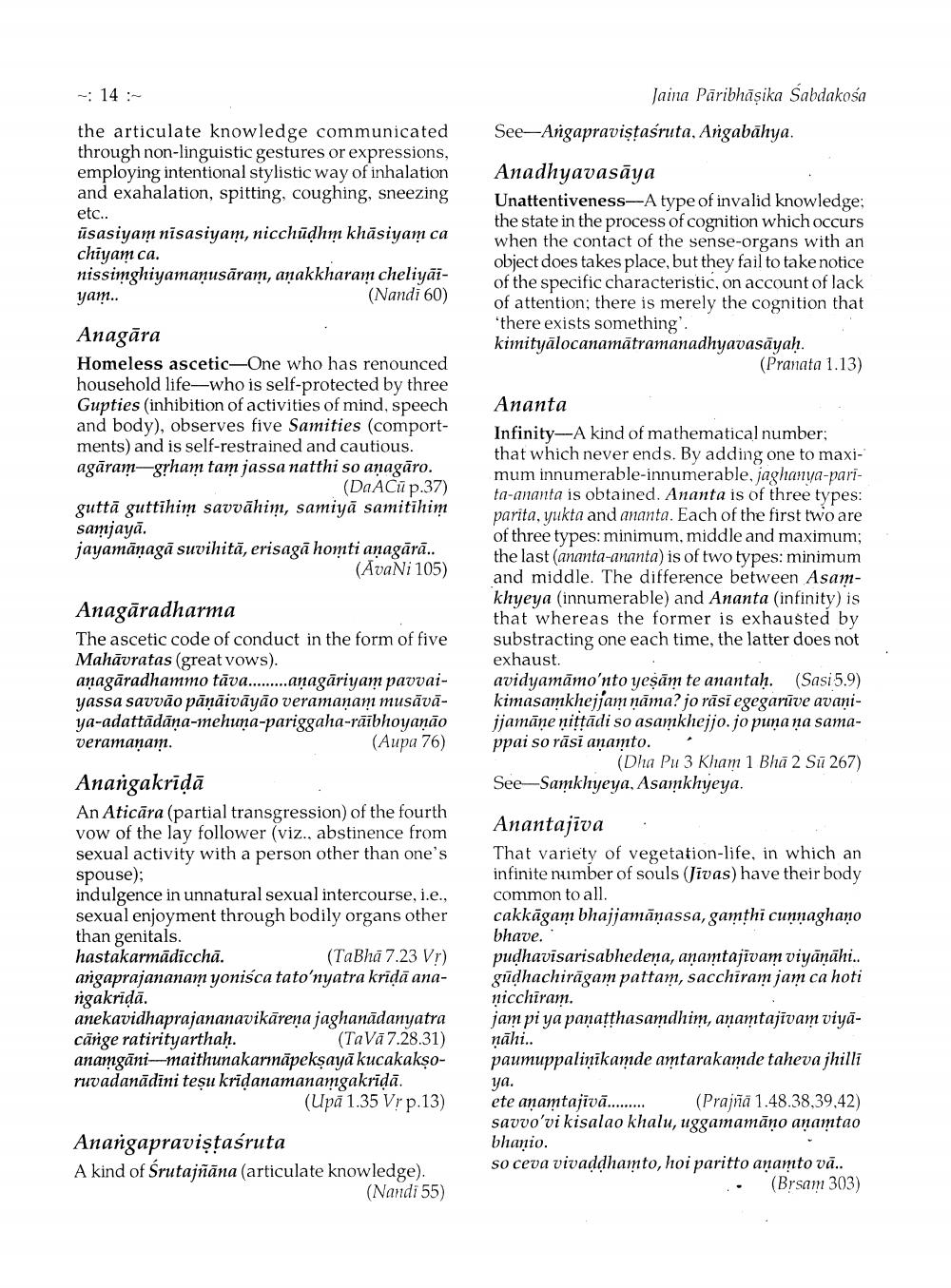________________
-
14:-
Jaina Paribhāșika Sabdakosa
See-Angapravistasruta, Angabāhya.
the articulate knowledge communicated through non-linguistic gestures or expressions, employing intentional stylistic way of inhalation and exahalation, spitting, coughing, sneezing etc.. üsasiyam nisasiyam, nicchūdhm khāsiyam ca chiyam ca. nissimghiyamaņusāram, anakkharam cheliyāiyam..
(Nandi 60)
Anadhyavasāya Unattentiveness-A type of invalid knowledge; the state in the process of cognition which occurs when the contact of the sense-organs with an object does takes place, but they fail to take notice of the specific characteristic, on account of lack of attention, there is merely the cognition that there exists something. kimityālocanamātramanadhyavasāyaḥ.
(Pranata 1.13)
Anagāra Homeless ascetic-One who has renounced household life—who is self-protected by three Gupties (inhibition of activities of mind, speech and body), observes five Samities (comportments) and is self-restrained and cautious. agāram-grham tam jassa natthi so anagāro.
(Da ACū p.37) guttā guttihim savvāhim, samiyā samitihim samjayā. jayamāṇagā suvihitā, erisagā homti anagārā..
(AvaNi 105)
Ananta Infinity--A kind of mathematical number; that which never ends. By adding one to maximum innumerable-innumerable, jaghanya-parita-ananta is obtained. Ananta is of three types: parita, yukta and ananta. Each of the first two are of three types: minimum. middle and maximum: the last (ananta-ananta) is of two types: minimum and middle. The difference between Asamkhyeya (innumerable) and Ananta (infinity) is that whereas the former is exhausted by substracting one each time, the latter does not exhaust. avidyamāmo'nto yeşām te anantaḥ. (Sasi 5.9) kimasamkhejjam ņāma? jo rāsi egegarūve avanijjamāne nittādi so asamkhejjo.jo puna na samappai so rāsi anamto.
(Dha Pu 3 Klam 1 Bhā 2 Sū267) See-Samkhyeya, Asamkhyeya.
Anagaradharma The ascetic code of conduct in the form of five Mahāvratas (great vows). anagāradhammo tāva.........anagāriyam pavvaiyassa savvão pānāivāyāo veramanam musavaya-adattādāņa-mehuņa-pariggaha-rāibhoyaņāo veramanam.
(Aupa 76)
Anangakrīdā An Aticāra (partial transgression) of the fourth vow of the lay follower (viz., abstinence from sexual activity with a person other than one's spouse); indulgence in unnatural sexual intercourse, i.e., sexual enjoyment through bodily organs other than genitals. hastakarmādicchā.
(Ta Bhā 7.23 Vr) arigaprajananam yonisca tato'nyatra kridā anangakridā. anekavidhaprajananavikāreņa jaghanādanyatra cārge ratirityarthah.
(Tavā 7.28.31) anamgāni-maithunakarmāpekṣayā kucakakşoruvadanādini teşu kridanamanamgakridā.
(Upā 1.35 V, p.13)
Anantajīva . That variety of vegetation-life, in which an infinite number of souls (Jivas) have their body common to all. cakkāgam bhajjamāṇassa, gamthi cunnaghano bhave. pudhavisarisabhedena, anamtajīvam viyānāhi.. gūdhachirāgam pattam, sacchiram jam ca hoti nicchiram. jam pi ya panatthasamdhim, anamtajivam viyaņāhi.. paumuppalinikamde amtarakamde taheva jhilli ya. ete anamtajivā......... (Prajñā 1.48.38,39,42) savvo'vi kisalao khalu, uggamamāņo anamtao bhanio. so ceva vivaddhamto, hoi paritto anamto vā..
.. (Brsam 303)
Anangapraviştaśruta A kind of Śrutajñāna (articulate knowledge).
(Nandi 55)




